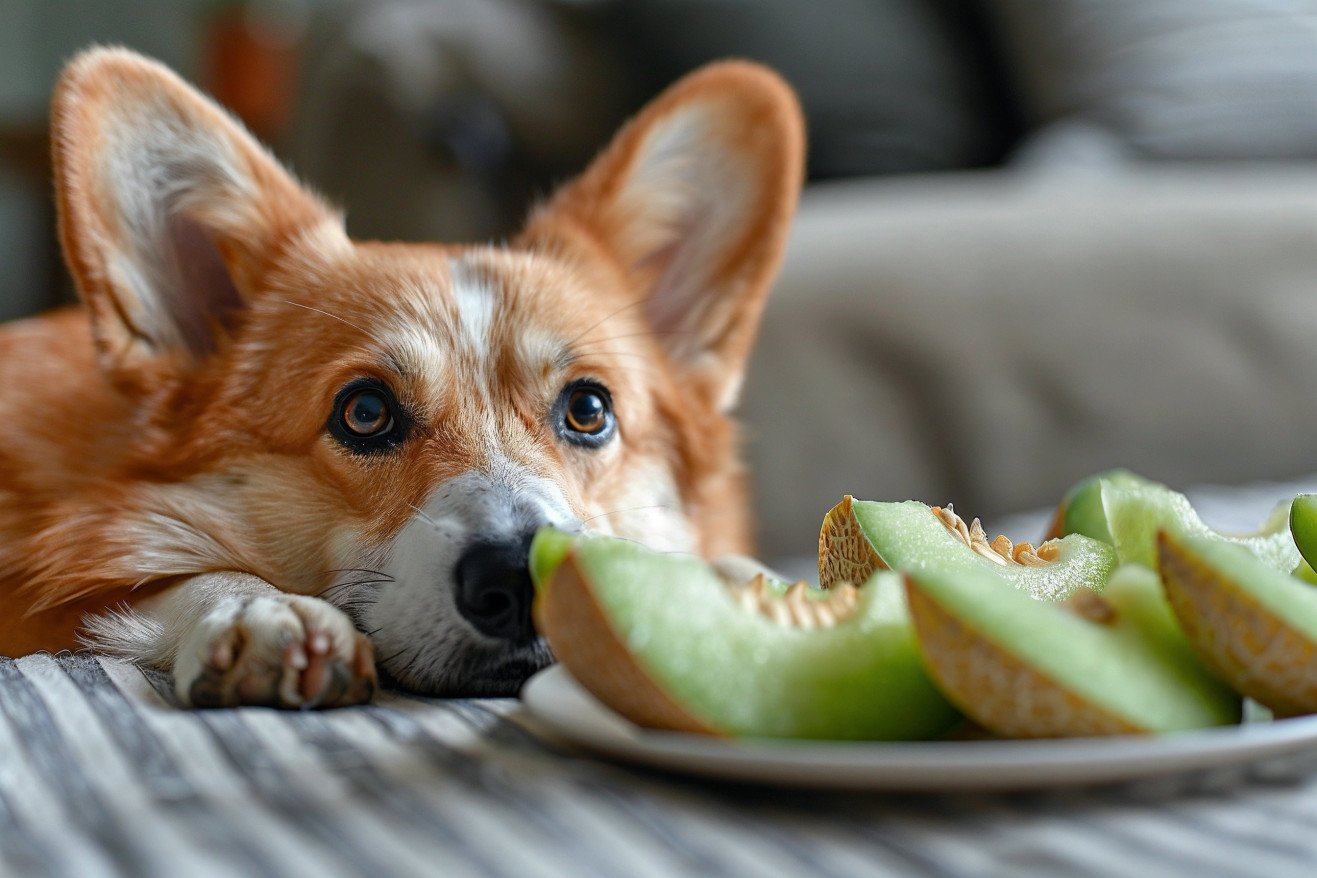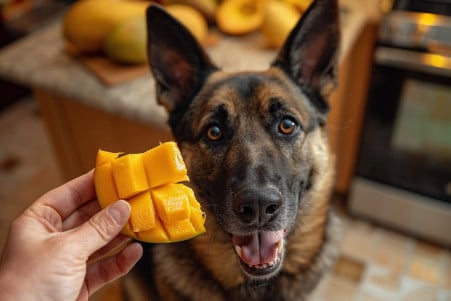Can Dogs Eat Honeydew Melon? A Sweet Snack to Approach with Caution
1 June 2024 • Updated 31 May 2024

If you’ve ever wondered whether your furry friend can enjoy a slice of honeydew melon on a hot summer day, you’re not alone. Honeydew melon is safe for dogs to eat, but there are a few important things to consider before you let your pup indulge in this sweet and juicy fruit.
Honeydew melon is a safe and non-toxic fruit for dogs that can be given as a treat in moderation. It’s a low-calorie, hydrating, and nutrient-rich food that can be a healthy addition to your dog’s diet, but it’s also high in sugar, so it should be fed to dogs sparingly.
In this evidence-based article, we’ll take a deep dive into what veterinary professionals, pet nutrition experts, and other animal care specialists have to say about the potential benefits and risks of giving honeydew melon to dogs.
By the end of this review, you’ll know how much honeydew melon is safe to feed your dog, whether there are any risks associated with giving honeydew melon to dogs with certain health conditions, and how to use this fruit to give your dog a special treat that’s both healthy and safe.
Can dogs eat honeydew melon?
Portion Control: How Much Honeydew Can Dogs Have?
Portion control is important when it comes to giving dogs honeydew melon. The amount of honeydew that you can give your dog will depend on their size and weight, according to Petful. Dogs that weigh less than 10 pounds can have less than one small piece, which is about the size of a dice, every one to two weeks. Dogs that weigh between 10 and 25 pounds can have one small piece every one to two weeks.
Dogs that weigh between 25 and 60 pounds can have one to two small pieces every one to two weeks at the most, according to Petful's detailed list. Dogs that weigh between 60 and 100 pounds can have three to four small pieces every one to two weeks. Dogs that weigh over 100 pounds can have a medium wedge of honeydew, cut into bite-sized pieces, every one to two weeks, as long as it's in moderation and doesn't cause any stomach upset.
It's important to start with smaller amounts of honeydew and see how your dog reacts before increasing the portion size. Wild Earth points out that while honeydew is safe for dogs, its high natural sugar content can cause health issues if it's eaten in large amounts. However, if you follow these recommendations and make sure that your dog doesn't eat too much honeydew, you can give them an occasional treat without worrying about their health.
Nutritional Benefits: Can Dogs Have Honeydew Melon?
Honeydew melon is a great way to help your dog stay hydrated, as it has a high water content. Purina also explains that it has fiber, which can help with digestion and ensure that your dog has regular bowel movements. In addition, honeydew has vitamins A and C, which are antioxidants and can help boost the immune system, according to Maven.
Honeydew is also a great way to give your dog essential minerals like potassium, magnesium, and manganese, which are important for a number of bodily processes, says Bug Bakes. The antioxidants in honeydew, including beta-carotene and selenium, can help lower inflammation and reduce the risk of certain diseases, according to Bug Bakes.
Although honeydew melon has these nutritional benefits, there are also potential risks and precautions to keep in mind when giving it to your dog.
Potential Risks and Precautions: Digestive Upset and Fruit Allergies
Although honeydew melon is safe for dogs to eat in small amounts, there are some potential risks and precautions to consider. As reported by WagWalking, the high sugar content in honeydew can lead to digestive upset, such as vomiting or diarrhea, in dogs that eat too much. Dogs with diabetes or other sugar-processing disorders should either avoid honeydew completely or get a vet's approval before eating it.
In addition, some dogs may have a fruit allergy to honeydew, which can cause skin issues, digestive problems, or even anaphylaxis, according to WagWalking. Finally, if a dog eats too much honeydew, including the rind or seeds, it can lead to gastrointestinal blockages or other health issues, as reported by Vet Playas Veterinary Hospital.
Make sure to watch your dog closely for any adverse reactions to honeydew and get them to a vet immediately if they have a severe reaction. As long as you're careful about the amount of honeydew you feed your dog and watch for signs of a fruit allergy, you can give your furry friend this tasty, hydrating treat on occasion.
How to Make Honeydew Safe for Dogs: Removing the Skin and Seeds
The skin and seeds of honeydew melon need to be removed before you can give it to your dog, says Dogster. The skin is too tough and can be a choking hazard, and if it’s swallowed, it can cause a blockage in your dog’s digestive system. The seeds can also be a choking hazard and can cause digestive issues if your dog eats them.
You should only give your dog the flesh of the melon, and you should cut it into small pieces that are easy for your dog to eat. The Dodo stresses that the skin and seeds of honeydew, as well as other melons like cantaloupe and watermelon, are not safe for dogs and should be removed before you give your dog the fruit.
Frozen honeydew pieces can be a great way to give your dog a cool, hydrating treat in the summer, according to PetCube. If you remove the skin and seeds from the melon, you can give your dog a sweet treat that’s safe to eat as an occasional snack.
Conclusion: Honeydew Melon Can Be a Healthy and Refreshing Treat for Dogs in Moderation
Honeydew melon can be a healthy and refreshing treat for dogs when fed in moderation and with proper precautions. It provides valuable nutrients like vitamins, minerals, and antioxidants that can benefit a dog's overall well-being. However, its high sugar content means it should be an occasional treat, especially for dogs with dietary restrictions.
Always remove the rind and seeds before feeding, and monitor serving sizes based on the dog's size and weight. With careful preparation and portion control, honeydew can be a safe and enjoyable addition to a dog's diet.


